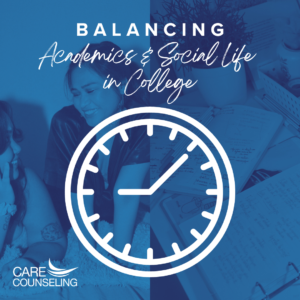Balancing Academics and Social Life in College
 Embarking on your college journey marks a significant chapter in your life, filled with new academic challenges, personal growth, and exciting social opportunities. As you navigate through this transformative period, finding the right balance between your academic commitments and social interactions is key to making the most of your college experience.
Embarking on your college journey marks a significant chapter in your life, filled with new academic challenges, personal growth, and exciting social opportunities. As you navigate through this transformative period, finding the right balance between your academic commitments and social interactions is key to making the most of your college experience.
Recognizing the Importance of Balance
Balancing academics and social life might seem like a daunting task, but it’s crucial for your overall well-being. Striking this balance enables you to excel in your studies, build lasting friendships, explore new interests, and make cherished memories. It’s all about managing your time and priorities effectively, ensuring that neither your grades nor your social life suffer.
Mastering Time Management
Time management is your ultimate tool for achieving balance. Create a weekly schedule that allocates specific blocks of time for classes, studying, socializing, and personal activities. Stick to this schedule as closely as possible, and you’ll find that you have more time than you thought to dedicate to both your studies and your social life.
Prioritizing Academics
While socializing is an important aspect of college life, your primary reason for being in college is to learn and earn your degree. Set academic goals and deadlines for yourself, and consistently meet them. Allocate your peak energy hours to intensive studying, and break down large tasks into smaller, manageable chunks to make studying more efficient and less overwhelming.
Setting Social Goals
Just as you set academic goals, establish social goals as well. Decide how many social events or gatherings you want to attend each week while maintaining a healthy balance with your academics. This proactive approach ensures that your social interactions are intentional and contribute positively to your overall college experience.
Creating Study Groups
Combine socializing and studying by forming study groups with your peers. Not only does this allow you to collaborate and learn from others, but it also provides a structured environment for both academics and social interactions. Just be sure to strike a balance between productive study sessions and moments of camaraderie.
Quality over Quantity
When it comes to socializing, focus on the quality of your interactions rather than the quantity. Engage in meaningful conversations, build deeper connections, and participate in activities that align with your interests. This way, you’ll make more meaningful friendships while keeping time for your studies.
Embracing Social Opportunities
College offers a plethora of social opportunities, from clubs and organizations to events and gatherings. Be selective and choose activities that genuinely interest you. This way, you can fully engage in the social scene without feeling overwhelmed or sacrificing your academic responsibilities.
Utilizing Breaks Wisely
Breaks between classes and study sessions are excellent opportunities for socializing. Instead of mindlessly scrolling through your phone, engage with your peers. Grab a quick coffee, have a chat, or organize a short group activity. These moments of connection can be just as rejuvenating as a longer social event.
Scheduling Downtime
It’s easy to get caught up in the academic-social cycle and forget to take care of yourself. Prioritize self-care by scheduling downtime for relaxation, hobbies, and alone time. This rejuvenation will help you maintain your focus during study sessions and make your social interactions more enjoyable.
Learning to say No.
While it’s important to socialize, don’t be afraid to say no when you need to dedicate more time to academics. Your friends and peers will understand that you have responsibilities and commitments. Learning to set boundaries and prioritize your needs is a valuable skill that will serve you well throughout life.
Balancing academics and social life in college is an art that requires intentional effort and strategic planning. By mastering time management, setting clear goals, embracing meaningful social opportunities, and prioritizing self-care, you can strike a healthy equilibrium that allows you to excel academically while also making lifelong friendships and unforgettable memories. Remember, finding the right balance is a personal journey, and adjusting as needed will ensure that your college experience is enriching, fulfilling, and well-rounded.



























